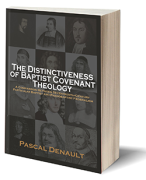Archive
Some say the sacred use of a word is frequently quite different from the classical use
 Chapter 7-1: Baptizo – Classical and Biblical.
Chapter 7-1: Baptizo – Classical and Biblical.
But another class of persons endeavor to go deeper, not relying upon the opinions of others. They say, grant that the classical use of baptizo is as the lexicons mentioned teach, that it always means immerse, and kindred ideas; yet the Biblical use is very different, for in the Bible it certainly sometimes means sprinkle or pour. The attempt is made to show this from various passages; really, it seems that so many are tried because it is felt that none of them are exactly conclusive. I should be glad to go over all that have been thus appealed to, but time does not allow that, and I can only mention those which are most frequently relied on, or which seem most plausible.
I. It is said that, in the case of certain other words, such as pastor, bishop, elder, church, supper, the sacred use is frequently quite different from the classical use; and this is thought to afford a presumption that there is also a difference as to the word baptize. But most of these words have not changed their meaning to something quite different; there is only a figurative or novel application, while the ground idea remains the same. Thus the pastor is a shepherd (figuratively), the bishop is an overseer (spiritually), the church is an assembly (actual or ideal). So baptize is still an immersion, having only a special reference and meaning. The word “supper” has been much insisted on, as having a wholly different sense in the New Testament from its classical use. But when the Apostle Paul speaks of the Christians as coming together to eat “the Lord’s Supper,” (I Cor. 11:20) it was a supper. We continue to apply the term “supper” when it is eaten at other times of the day, but Scripture does not so apply it. Besides, our Lord did not tell us to eat a supper, but to eat bread and drink wine. This is what we must do; and we make here no substitute, either for the elements (bread and wine) or for the action (eating and drinking). So the appeal to “supper” is quite inappropriate. The use of “elder,” however, seems to be a case in point, for this word has changed its meaning. But the change is not in sacred, as distinguished from secular use. The application of the term “elder” to a person who is not old is found in classical Greek, as also in Latin and English. The Greek word presbus, an old man, is used in classical Greek to denote an honorable man, an ambassador, a senator. So with the Latin senator, and the English alderman. This, then, is not a case in which the word acquires an entirely different sense in sacred from what it had in classical use. And so all the examples cited break down, and this supposed analogy and consequent presumption, much relied on by some, amounts to just nothing.
John A. Broadus-Immersion Essential to Christian Baptism
The New Testament is Reliable
In this video James White makes a case for the reliability of the New Testament. There is more manuscript evidence for the New Testament, than there is for any piece of literature from antiquity.
The Reliability of the New Testament Text (Dr. James White)












Recent Comments